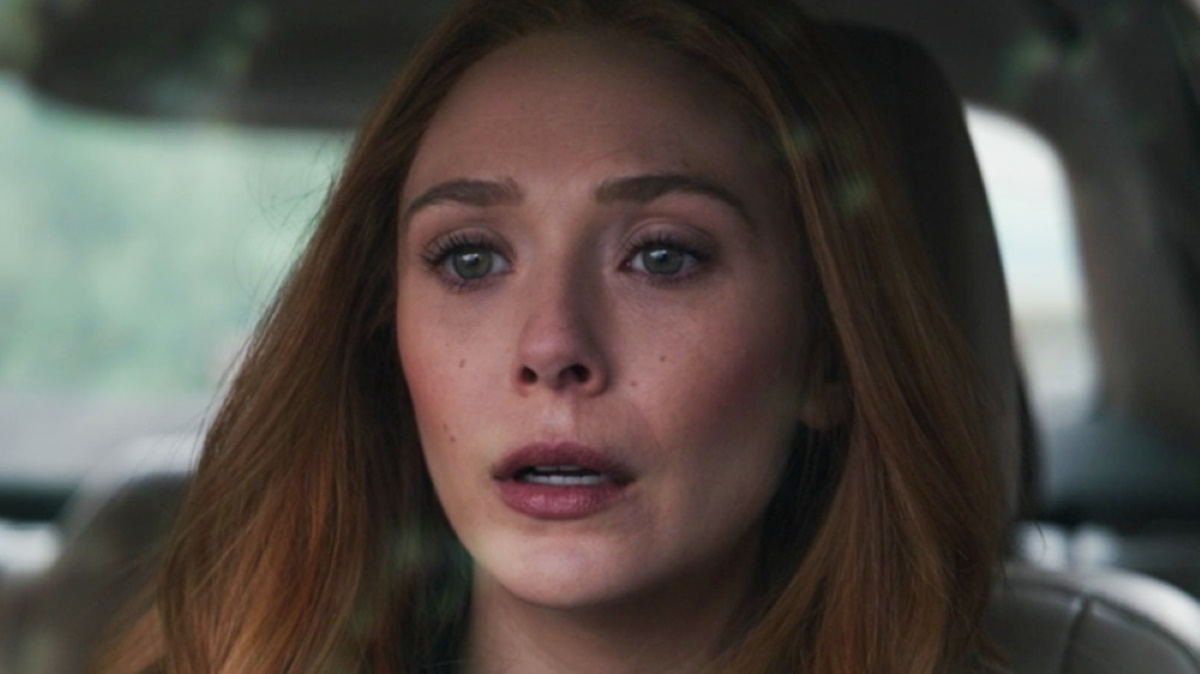WandaVision‘s Meditation on Grief Is a Perfect Metaphor for the Pandemic
We're all in Westview now.

***SPOILER ALERT: This post discusses the events of the finale of WandaVision.***
What do you call it when a piece of pop culture arrives at the most prescient time, tapping into a contemporary yet timeless experience? It must be some kind of alchemy or witchcraft, when culture coincides with and reflects our own experience as we are living it. Like The Handmaid’s Tale premiering after Trump’s inauguration or The Good Place‘s counter-programming to the relentless malevolence of the past 4 years, Marvel and Disney+’s WandaVision has tapped into our collective sublimated grief one year into the COVID-19 pandemic.
Years from now, when the pandemic is a page in the history books, younger generations will ask us what it was like to live through this time, when over 500,000 Americans died in a single year. Even now, as we are living it, it feels unquantifiable. If you’ve lost a loved one, the pain is still fresh and palpable. But if you haven’t, there is still so much to grieve.
There is also an air of unreality to the incalculable loss, thanks to the Trump administration’s denial and downplaying of the dangers of the virus, and the barrage of lies and inaction from those in power writing it off as a “bad flu.” With honesty absent for the past year, there has been no public memorial, no acknowledgment of the levels of loss and grief. There has been no collective catharsis, although the Biden administration has already held multiple services and memorials to remedy that.
WandaVision is many things, but it is ultimately a meditation on grief and loss. As the series unfolded, the parallels between Wanda Maximoff’s journey and our own began to stack up. In episode 8, “Previously On”, we see Wanda arrive at S.W.O.R.D. headquarters to retrieve Vision’s body. Looking down on his dissembled form, Wanda breaks the glass to rest her hand on his forehead, saying “I can’t feel you.” Hayward denies Wanda’s request for a funeral, and she quietly walks away, gets in her car, and drives to Westview.
Part of Wanda’s explosion of grief is the denial of any sort of catharsis or sympathy, compounded by the previous trauma in her life. Anyone who has attended a Zoom funeral, who couldn’t visit their dying loved one in a hospital due to the pandemic, knows exactly how she feels. Funerals and memorials are necessary to provide closure, to acknowledge the loss of a life. Without them, grief feels unfinished and unacknowledged. Catharsis is paralyzed and overtaken with numbness and despair.
But the suffering is both personal and collective. At a time when we want to hold one another close, when we need community and connection, that has been denied to us as well. Social distancing and quarantine keep us safe, but a year in relative isolation has had profound effects on our mental health. Wanda too finds herself isolated: the loss of Pietro and Vision is compounded by the loss of the Avengers, her found family. Tony Stark, Natasha Romanoff, and Steve Rogers are gone. When Wanda comes back to reality after the Blip, she is utterly alone.
Is it any wonder then, that this deep isolation and overwhelming grief leads to an explosion of her uncontrollable powers that reshape the whole of Westview? Wanda retreats into her sitcom safe space and builds a family with sheer force of will. She creates her own bubble, untouched by the outside world. Those of us who have been hunkered down in our homes, binge-watching TV to find comfort, can surely relate.
The worst part is, we are all expected to move through this pandemic as if everything is fine. Work deadlines, which have never felt less important, are still expected. Productivity is demanded from parents struggling to work and raise children with no school or childcare. The rise and grind culture is demanding that we use this time valuably to write a novel or learn a new skill. We are all citizens of Westview, going through the motions, pausing for the laugh break with tears in our eyes.
In the end though, the fantasy doesn’t last. It can’t. The Hex comes down, and Wanda is once again confronted by her grief. But as Vision reminds her, “what is grief but love persevering?” I can’t help but wonder what the future holds, as vaccines roll out and an end to the pandemic is in sight. What will happen to us when our bubbles are broken and we re-enter some semblance of the Before? We have to find a way to express our collective grief, both the loss of the living and the loss of the world we once knew. Our love must persevere, but to do so we need to acknowledge our collective trauma. I wonder if there’s a spell in the Darkhold for that.
(featured image: Marvel Studios/Disney+)
Want more stories like this? Become a subscriber and support the site!
—The Mary Sue has a strict comment policy that forbids, but is not limited to, personal insults toward anyone, hate speech, and trolling.—
Have a tip we should know? tips@themarysue.com